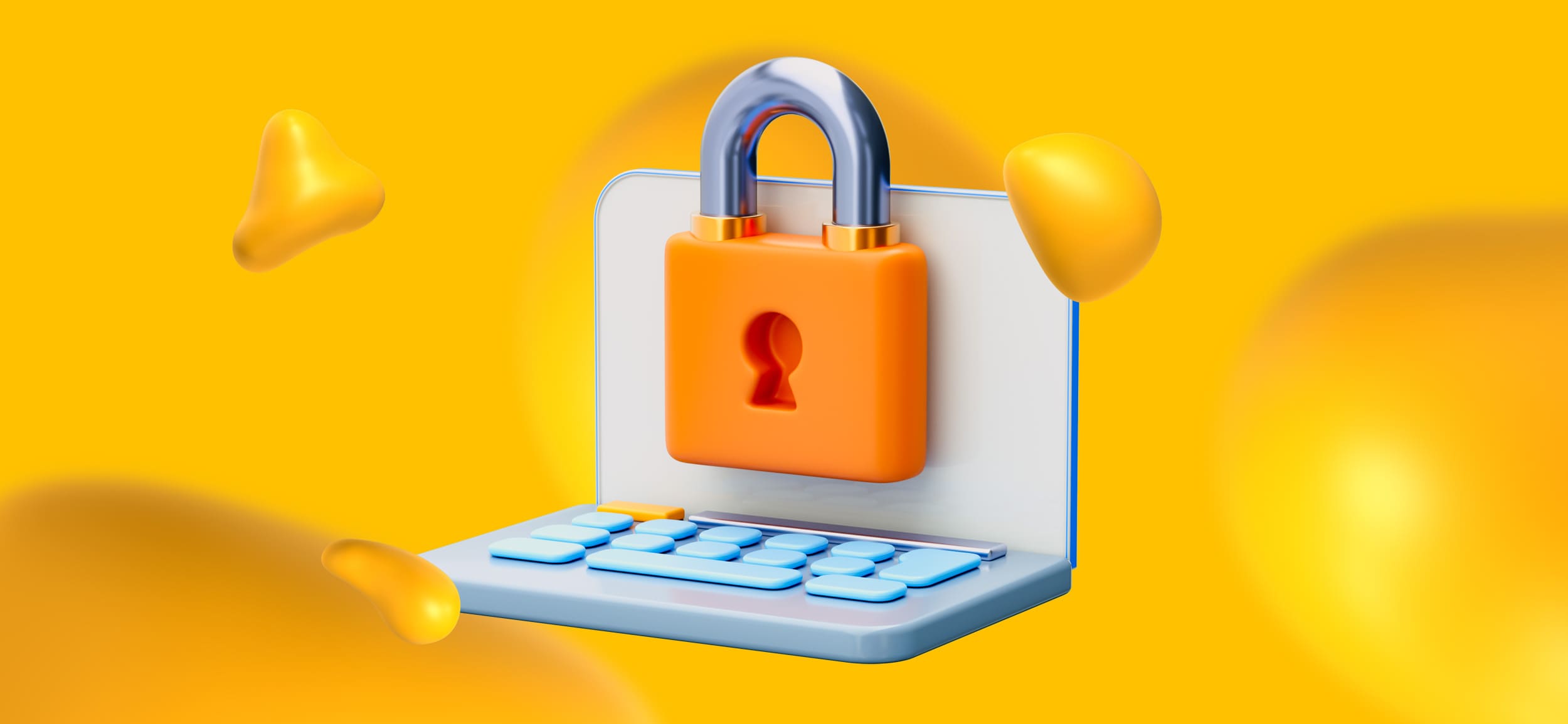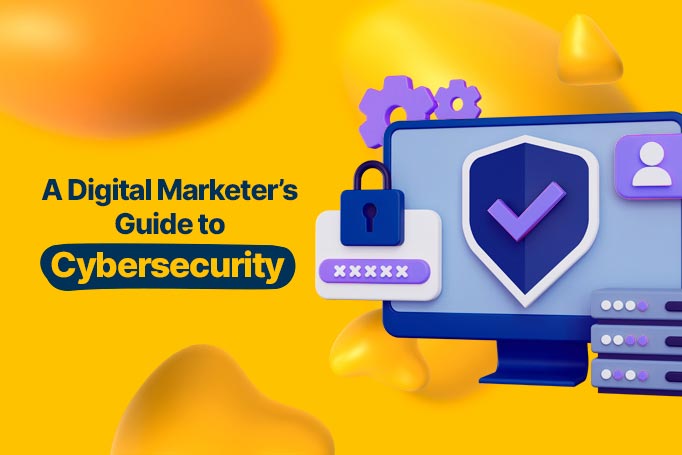Let’s face it.
Advertising platforms are selling one thing: the mental bandwidth of users.
It’s true, and the model they use to sell that product is access to users’ personal data.
You, the advertiser, are their customer and, in today’s digital age, data is the most valuable commodity there is.
Think about it. You need data to generate leads, gain insight, personalize customer experiences, and increase your conversions.
But just like our dearly departed Uncle Ben used to say, “With great power, comes great responsibility.”
That’s why cybersecurity in digital marketing is so very important to your reputation and your success.
It’s not just your customers’ data that could be at risk of cyberattack either. Don’t forget that your marketing team is also being tracked by the platforms they’re using to launch and manage campaigns.
We in the digital marketing space are massive targets for hackers, which is why this blog is here to help with some easy-to-use tips to keep both your data and your customer's data safe from cybersecurity threats.
The Risks of Not Protecting Your Data
Security breaches can have some disastrous consequences on a business.
Not only can it lead to loss of revenue for your company (and a huge PR nightmare to deal with on top of that), it can also open you up to legal action, put your valued customers at risk, and completely dissolve their trust in you.
Unfortunately, data breaches happen all the time and to companies both big and small.
Maybe you’ve gotten that email yourself; the one that an embarrassed company sends out to admit that they’ve been attacked and now your sensitive information is floating out there on the web for anyone to buy and take advantage of.
If it’s happened to you before, then you know it’s not a good feeling.
Digital Marketing Privacy and Security
You don’t want cyberattacks to happen to you and, above all, you don’t want your business to be the next one who has to send out that “how embarrassing, we've just been hacked” email.
As digital marketers, we face unique challenges, since we not only handle our own data but that of our customers. We have access to all manner of invasive tracking technologies as well, so it’s up to us to set the standard for security, privacy, and ethics.
If your passwords get hacked, you stand the risk of exposing many people’s information.
We don’t want that and neither do you, so here are the best ways to avoid that unpleasant situation and keep yourself a step ahead of the hackers.
Hey Marketers, Get Prepared!

We find the best way to avoid embarrassing and devastating data breaches is to always be prepared.
To help you do that, here is a handy checklist for you to consult to make sure your cybersecurity and network security is always up to date.
Cybersecurity Basics Checklist
1. Use a strong and unique password for every app, every service, and every website you use. And when we say “unique,” we mean it! Never, ever repeat a password. Period. Never.
It may sound like a pain, but it should not be possible for you to memorize your passwords, because you should have hundreds or thousands of them! Why? Because when your password gets cracked — when, not if — the hacker will only have access to that one service, minimizing damage. This leads us to …
2. Use passwords that are impossible to remember, with multiple random words, combined with special characters, so they can’t be guessed. We know you love your old dog Sparky and who doesn’t love their birthday, but if your password can be easily guessed by someone who knows you or by filling out a password farming post on Facebook, it’s not a good password.
3. Use a password management tool so you’re never tempted to use memorable, easily guessed passwords. The ultimate is a printed sheet of passwords that you keep constantly updated and stored in a fire-safe container.
However, since that may not be feasible for most, we recommend choosing a cloud-based service with a reputation for not getting hacked. Make sure it’s easy to use and integrates into your operating system seamlessly so that you’ll actually use it.
4. Now that you’ve got all those passwords to store, you’ve got to keep your machine up to date!
Always install every operating system update (with the exception being large upgrades that might crash your apps if you’re an early adopter). A good rule of thumb is to install anything that’s under your operating system’s main number. For example: Install 12.4.x to 12.5.x, but do not install 12.x.x to 13.x.x until you know it’s safe to do so.
When in doubt, just install any update available for maximum security.
5. Install all app/program updates the moment they’re available.
6. Restart your computer at least once a week to ensure that any updates get installed. You‘d be surprised how many apps hold off on updating until a restart takes place!
7. Take regular backups of your system and files. If you’re using a cloud system, that’s the easiest way to make sure you can quickly recover from a hack.
A good way to look at it is, “I will get hacked soon and I will have to delete everything on my computer. I, therefore, need to be able to reinstall everything from scratch at a moment’s notice.”
Keep a safe record of your password manager’s login, of your email address login. Keep a record of your most important apps and where to go to re-download them. If you use a VPN, write down its settings. Do this and you’ll be able to recover within a couple of hours from getting hacked. In addition, you could intentionally clear out your hard drive and reinstall everything for a faster computer!
8. Consider using a more secure web browser. The easiest recommendation is Brave, as it uses the same rendering engine as Google Chrome, but adds in a layer of security without any extra work.
9. Use a more private search engine. We recommend DuckDuckGo as a quick and easy way to increase your security. All browsers allow DuckDuckGo to be used in the search bar; simply look to your browser’s settings/preferences to find this option.
10. Check your computer’s settings for a Firewall and enable it. Shockingly, macOS still does not activate its firewall by default. That should be your first step when you buy a computer!
Digital Marketing Checklist
1. In addition to the points above, use a VPN any time you’re traveling or working outside of your home. There are free VPNs available, including the option to have your company’s IT department set up one using an office router.
2. On your website and on any client websites, be sure to install and activate SSL certificates. Most modern web hosting companies now include AutoSSL to enable free SSL certificates. This allows for secure, encrypted communications between the website and its users.
3. Eliminate any unnecessary scripts from your website and your clients’ websites. It’s best practice to look through all third-party and custom scripts quarterly to ensure that the necessary ones are up to date (script makers update their scripts regularly, so re-embed them!) and to remove any old unneeded scripts and plugins.
4. Update installed themes, plugins, and frameworks monthly on your website and your clients’ websites. Even if it causes a website to crash, it’s better to recover from a crash than to recover from a hack! Take backups beforehand, update plugins first, then frameworks, then themes, then CMS core.
5. Be sure to keep anti-virus software up to date, along with staying fresh on any regular requirements that are specific to your and your clients’ industries. Be especially careful about what kind of data you collect and track in your campaigns too! Some industries are more stringent than others.
Remember that you can always lean back on old-school methods of tracking marketing success. Companies grew and employed powerful marketing campaigns for centuries without information technology or invasive privacy-tracking code! So, you can too if need be!
Stay on Top of Your Security Risks
Sometimes prevention is the key.
To catch any security risks before they become an issue, it’s a good idea to have your IT department or a third-party security consultant/ risk management team run regular risk assessments on your network. This will help you identify any vulnerabilities you may have and give you a chance to mitigate those potential risks before something happens.
You should also monitor your web analytics on a regular basis. Doing this can help you detect any unusual activity, such as a sudden increase in traffic from a suspicious source. Staying on top of potential weak links in your security is the key to making sure your data, network, and endpoint security are always up-to-date and effective.
Educate Your Team

Unfortunately, the weakest chink in an organization’s armor is often its employees.
Who’s on your team? Social media managers, outsourced freelancers, HubSpot specialists, designers ... the list goes on.
Are you confident they have secure machines? Your employees communicate through email with many different people as they follow leads, so it’s important for you to put an emphasis on user education. It may seem obvious, but it’s always a good idea to train your employees about the dangers of clicking on dubious links, opening suspicious emails, and downloading content from unknown sources.
If your employees are managing user accounts and other marketing tools, like social media/ social media management platforms or sites for KPI tracking, be sure they are using our password tips above and that the sites they are using are encrypted and secure.
Regular training on cyber security is also a good way to reduce the risk of incidents, keep your employees up to date on the threats they need to watch out for, and give them the knowledge they need to be able to report any potential security threats they happen to come across.
Update Your Software Regularly
We mentioned this a bit earlier in this article, but it does bear repeating!
Cybercriminals are constantly finding new ways to exploit any vulnerabilities in your software and firewalls so, by keeping those updated, you can reduce the risks of vulnerabilities in your security and keep yourself ahead of the ever-evolving threats that always seem to be looming around the corner.
Depending on what industry you’re in, having appropriate security measures to protect sensitive data might also be a requirement as well.
Keeping everything up to date not only keeps you safe, but also keeps your organization in compliance with these regulations.
<div class="c-blog_comp-cta cc-component-1"><div class="c-blog_comp-cta-left"><div class="c-blog_comp-cta-left-wrap"><img src="https://global-uploads.webflow.com/61cdf3c5e0b8155f19e0105b/6369722e59155470b6840033_Potential-clients.png" loading="lazy" alt="" class="c-blog_comp-cta-left-img"></div></div><div class="c-blog_comp-cta-right"><div class="c-blog_comp-content"><div class="c-text-wrapper cc-mb-32"><div class="c-title-4 cc-bold"><strong>Want to save money without sacrificing the quality?</strong></div></div><div class="c-text-wrapper"><div class="c-text-2">Say goodbye to traditional, expensive agencies and unreliable marketplaces. Say hello to Designity.<br></div></div></div><div class="c-blog_comp-wrapper"><a href="/pricing" target="_blank" class="c-button cc-primary cc-inverted w-button"><strong>Get Your 2-Week Trial</strong></a></div></div></div>
Stay Safe Out There!
Investing in the right data security is not just a good idea, but a responsibility that you owe your customers!
By following this guide, you can keep your data safe and prevent any embarrassing breaches that could harm your reputation and put your customers at risk.
At Designity, we understand the responsibility you have for your customers! That’s why, if you bring on a cybersecurity consultant or make any upgrades to your infrastructure, we will always work with any systems you put in place!
We always follow best practices and are happy to accommodate any specific workflows or security concerns our clients may have.
Schedule a demo call to see how your upcoming marketing and creative projects can stay on track while you keep your and your customers' data secure!
How do you protect your sensitive data?

























